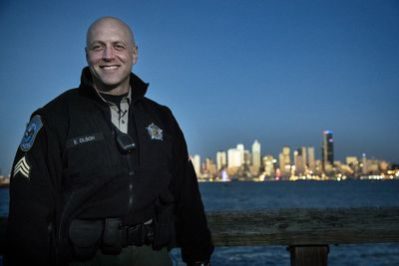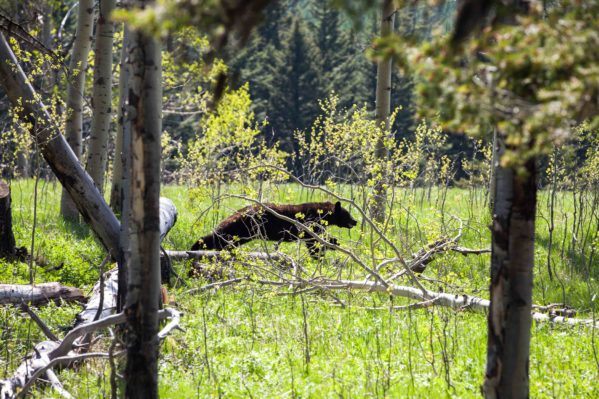INTERVIEW: Officers stop poachers in their tracks on new season of ‘Rugged Justice’

On the hit reality series Rugged Justice, which premieres new episodes Thursday, Aug. 25 at 10 p.m. on Animal Planet, officers with the Washington State Department of Fish and Wildlife head into rural and urban areas to stop poachers, protect resources and keep wildlife and humans from having an unwanted encounter. Their “rugged” job is readymade for reality television.
One of the show’s subjects is Sgt. Erik Olson, who said the new season captures some interesting clientele and events. “This particular season, man, there’s quite a bit of activity,” Olson said recently in a phone interview. “We’ve got everything from habitual crab poachers to basically cougar cubs that we’re trying to capture that are running through cities. We’ve got obviously a whole lot of fish and wildlife cases but also the interactions that we see with humans interacting with fish and wildlife as well. It always creates interesting situations obviously when you’ve got things like cougars and bears in metropolitan areas or encroaching upon those areas.”
The officers on the show don’t know what a typical day will look like mostly because there’s no such thing as a typical day with the Washington State Department of Fish and Wildlife. One day Olson may find himself stopping a commercial operation that is supported by poaching, and another day he might be on the streets of Seattle looking for a bear or cougar. It’s all in a day’s work.
“I work primarily in Seattle, so you have a large amount of people,” he said. “And you have a really large resource. You have fish, shellfish, wildlife in these areas, and you have certain wildlife populations that are encroaching on those areas. So you have the population, and you have the resources there. And then you also have the fifth largest port in the nation being Seattle.”
As far as poaching, the sergeant said he believes that Rugged Justice helps raise awareness of this criminal activity and how harmful it can be to the environment. “I want the word to get out there that if you’re going to go out and you’re going to poach, we’re going to do everything we can to stop you because if we don’t protect the resource, it’s not going to be around anymore,” he said. “And that’s one thing that I love about the show is that it is trying to get that message out there because I want people thinking we’re behind every bush or in Seattle behind every building.”
One might think that a common defense among suspects is that they didn’t know the regulations protecting the fish or mammal. However, Olson doesn’t seem to buy that defense. For starters, the sergeant often watches his suspects for a bit before approaching them with questions. He’ll start to gather visual evidence of their behavior, including stowing away specimens, which seems to point toward knowledge of the laws that protect these species.
“Very rarely do we just walk on someone without observing them first,” he said. “Virtually everyone I contact I’m going to watch them for a little while. I’m going to see what they’re doing. I’m going to see their actions. … You walk up to a guy, and he’ll [say], ‘Hey, I didn’t know,’ or ‘Hey, I didn’t know it was closed.’ And I’m like, ‘OK, if that was the case, then why did you hide this over here?’ Or, ‘Why did you lie to me when I first walked up to you?'”

Olson and the team are searching for the major players in the game, not only the person who makes a one-time mistake. “I’m looking for the people that are out there to harvest as much as they can without getting caught,” he said. “I’d say probably 90 percent of the tickets or the arrests I make are for people that intentionally are violating and are out there to try and poach.”
When the cameras are rolling on these officers, there is no acting. The scenarios are real. The suspects are real, and the cases can be quite detrimental to the environment. Olson was quick to point out that he’s not a guy who ever thought he would have a film crew following him around.
Admittedly, it was difficult for Olson to get used to having documentarians constantly filming his actions, but the producers and network matched him with professionals who knew their job as well as he knows poaching violations.
Still, for a law-enforcement officer who is trained to be alert to his surroundings, the camera over his shoulder was a new wrinkle in the day to day. “You don’t want somebody creeping up behind you when you’re trying to contact people,” he said. “You always have to be aware of your surroundings. I remember I had the film crew with me when all of a sudden I see out of the corner of my eye something come over my shoulder, and I’m thinking worst case scenario. I’m thinking a guy is ready to stab me, or punch me or something. And the boom mic, going out the corner of my eye, coming over my shoulder, it scared the crud out of me, and I mean stuff like that you’ve got to get used to.”
Because Olson is based in Seattle, one of his priorities is dealing with the unique challenge of wildlife in the city. Because human populations are encroaching on animal habitat, these mammals, some of them apex predators, are heading to the busy, bustling streets. That can present some problems.
“You have these housing developments that are continuing to encroach or to expand out, and you have these wilderness areas that obviously you’ve got a ton of cougar, bear, other types of wildlife that are inhabiting those areas,” Olson said. “And as that area dwindles, they move into these urban areas, and it causes a ton of problems. But there is a lot more awareness, and certain communities have been able to get things like bear-proof garbage cans to try to stop those bears from, for example, moving into those neighborhoods to seek for food. And also we have laws that continue to be developed to be able to protect those areas so there is enough area for wildlife.”
Ditto for the shellfish that can be caught right off the piers in Seattle. When a protected resource is so readily available, conflict is bound to emerge. Olson reminded those illegal anglers that some of this fish can be toxic, and it’s in their best interest — both from a legal and health perspective — to follow the guidelines.
“You have a huge population that know all they’ve got to do is go out here and poach in the middle of the night,” he said. “They’re going to be able to get quite a bit of fish and shellfish that could be toxic for them depending on what they get and when they get it. All we have is the commercialization piece where we know a lot of the stuff is being sold in local markets, and we have a big effort to try to take those entities down, the people that are supplying that money to be able to encourage the poaching.”
Olson is obviously a busy man, and protecting the fish and wildlife of Washington state is all in a day’s work.
By John Soltes / Publisher / John@HollywoodSoapbox.com
Rugged Justice premieres Thursday, Aug. 25 at 10 p.m. on Animal Planet. Click here for more information.

